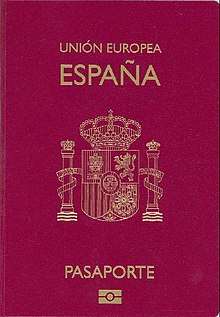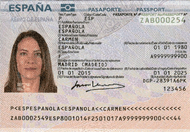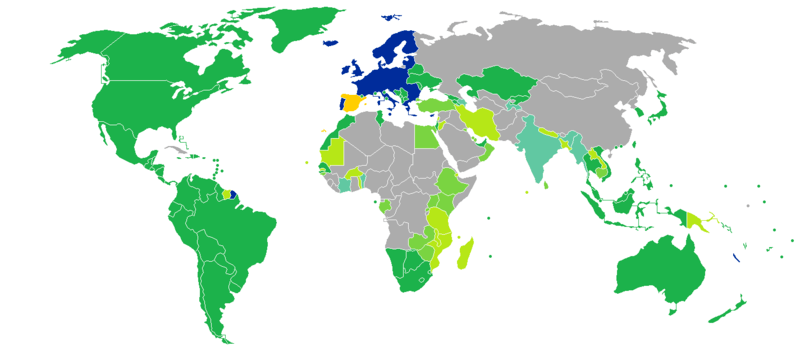Spanish passport
| Spanish passport | |
|---|---|
 Front cover of a contemporary Spanish biometric passport | |
 The data page of a contemporary Spanish biometric passport | |
| Date first issued |
January 2, 2015 (current version) August 14, 2006 (biometric passport) |
| Issued by |
|
| Type of document | Passport |
| Purpose | Identification |
| Eligibility requirements | Spanish citizenship |
| Expiration | Spanish passports expire 5 years after issuance when borne by citizens up to the age of 30, and 10 years for citizens aged 30-70; for travelers aged 70 and above, passports do not expire |
| Cost | €30.00[1] |
Spanish passports are issued to Spanish citizens for the purpose of travel outside Spain. Every Spanish citizen is also a citizen of the European Union. The passport, along with the national identity card allows for free rights of movement and residence in any of the states of the European Union and European Economic Area.
Types
- Ordinary Passport (Spanish: Pasaporte ordinario) - Issued for ordinary travel, such as vacations and business trips
- Collective Passport (Spanish: Pasaporte colectivo) - Issued for the occasion of pilgrimages, excursions and other acts of analogous nature, whenever reciprocity with the destiny country exists; its validity is limited a single trip, whose duration will not be able to exceed three months.
- Diplomatic Passport (Spanish: Pasaporte diplomático) - Issued to Spanish diplomats, top ranking government officials and diplomatic couriers.
- Official and Service Passports (Spanish: Pasaportes oficiales y de servicio)- Issued to individuals representing the Spanish government on official business
Visa free travel

As of May 2018, Spanish citizens had visa-free or visa on arrival access to 187 countries and territories, ranking the ordinary Spanish passport 3rd in terms of travel freedom (tied with the Finnish, French, Italian, South Korean and Swedish) according to the Henley visa restrictions index.[2]
Spanish citizens can live and work in any country within the EU as a result of the right of free movement and residence granted in Article 21 of the EU Treaty.[3]
See also
References
- ↑ Pasaporte
- ↑ "Global Ranking - Visa Restriction Index 2018" (PDF). Henley & Partners. Retrieved 22 May 2018.
- ↑ Treaty on the Function of the European Union (consolidated version)
| Wikimedia Commons has media related to Passports of Spain. |